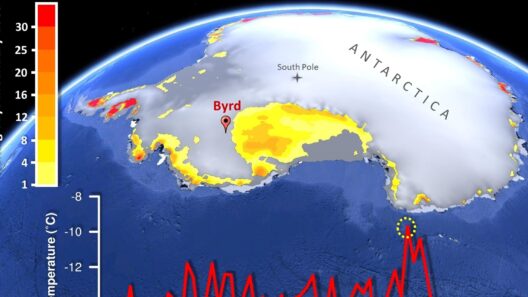Global warming, an ever-pressing dilemma facing humanity, has established an undeniable grip on our planet’s natural resources. As temperatures soar and weather patterns shift, the environmental implications manifest in multifaceted ways that extend beyond the immediate effects we often observe. The changing climate steadily reshapes ecosystems, disrupts agricultural patterns, endangers biodiversity, and strains resources critical to human survival. Understanding this extensive impact encourages a new perspective—one that integrates the immediacy of action with the complexity of ecological interdependence.
The Diverging Climate: An Overview
To comprehend the global warming phenomenon, one must first appreciate the intricate web of interactions among Earth’s systems. Carbon dioxide, methane, and other greenhouse gases trap heat in the atmosphere, leading to elevated temperatures. This escalating warmth triggers a cascade of climatic anomalies—more intense storms, prolonged droughts, and erratic precipitation. The implications for natural resources are profound, creating an urgency to reevaluate not only consumption patterns but our relationship with the environment itself.
Water Resources: The Thirst of the Earth
One of the most compelling facets of global warming’s impact is the strain on freshwater resources. As temperatures continue to rise, evaporation rates increase, exacerbating drought conditions in many regions. This scenario creates a dual challenge: a diminishing supply of potable water combined with increasing demand from agricultural and urban sectors. Regions once blessed with ample freshwater availability now encounter severe water scarcity, threatening not only human consumption but also food production systems reliant on irrigation.
Moreover, changes in precipitation patterns result in the displacement of groundwater recharge zones. Aquifers, essential for drinking water and irrigation, are being depleted at an alarming rate. The juxtaposition of parched landscapes and inundated regions during extreme weather events elucidates the unpredictable nature of climate change. The contentious battle for water is no longer confined to isolated areas; it becomes a global concern, prompting disputes over resources once considered abundant.
Agriculture Under Duress
Climate-induced alterations do not halt at water resources; agriculture also finds itself ensnared in the turmoil. Cultivation depends on predictable weather and stable growing seasons, both of which are becoming increasingly volatile. Heat stress and altered rainfall patterns adversely affect crop yields, compromising food security worldwide. This volatility is further exacerbated by pests and diseases that thrive in warmer climates, presenting new challenges to agricultural sustainability.
Some regions may experience crop failures, while others may witness the encroachment of non-native species, jeopardizing traditional farming practices. As yields fluctuate, the economic implications ripple through societies, leading to rising food prices and exacerbating social inequalities. Innovative agricultural practices and adaptive strategies are essential for mitigating these effects, yet the urgency for global solutions cannot be overstated.
Biodiversity and Ecosystem Integrity
Navigating the labyrinthine corridors of climate change invariably leads to the consideration of biodiversity. Natural ecosystems function as critical buffers against climate change; they help regulate the atmosphere, purify water, and promote soil health. However, as habitats alter under the weight of rising temperatures, species struggle to adapt. The resulting loss of biodiversity constitutes not merely a tragic decline of species but a fundamental disruption of ecosystem services vital for sustaining life.
Coral reefs, critical marine ecosystems, experience bleaching due to elevated water temperatures and acidification, leading to widespread declines in marine life. Terrestrial habitats grapple with species migration, as animals seek cooler environments or suitable diets, creating imbalances that reverberate through food webs. Preserving biodiversity is imperative; the loss of even a single species can have catastrophic consequences on ecosystem stability, further intensifying resource strain.
Energy Resources and Fossil Fuels
The energy sector constitutes another arena deeply affected by global warming. Dependence on fossil fuels perpetuates a cycle of environmental degradation and climate destabilization. Increased fossil fuel extraction and utilization lead to higher emissions of greenhouse gases, aggravating the crisis. Simultaneously, renewable energy sectors face challenges due to changing weather patterns impacting resource availability. The reliance on hydroelectric power, for example, diminishes in periods of drought, underscoring the need for diverse energy portfolios.
Transitioning to sustainable energy sources remains an avenue of respite; however, it necessitates a revolutionary shift in policy, infrastructure, and societal norms. The potential for renewable energy—solar, wind, and geothermal—is immense. Harnessing these resources carries the promise of reducing emissions while ensuring energy security, but this radical transformation demands collective resolve and investment in innovation.
Rethinking Resource Management
The strains imposed by global warming compel a reevaluation of resource management strategies. Traditional paradigms of consumption overlook the intricate connections between resources, ecosystems, and human activity. A systems-based approach, recognizing interdependencies, paves the way for comprehensive solutions. Sustainable practices, such as circular economy models, regenerative agriculture, and integrated water resource management, hold promise for alleviating the mounting pressures on our planet.
Incorporating indigenous knowledge and community-based stewardship can also enhance resilience. These time-honored practices often yield insights into sustainable land use and conservation strategies attuned to local ecosystems. When communities actively engage in resource management, the outcomes become mutually beneficial, promoting ecological integrity alongside social equity.
Conclusion: A Call to Action
Global warming’s grip on natural resources serves as a stark reminder of the interconnectedness of our world. Only by collectively acknowledging and addressing this reality can we forge a sustainable pathway forward. Transformative change is imperative—not merely to sustain natural resources, but to ensure the viability of human existence itself. As we navigate this challenge, curiosity and a willingness to shift our perspectives will unlock the potential for innovative solutions and resilient futures.







